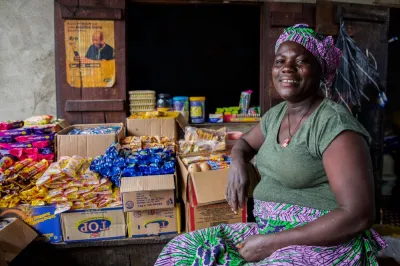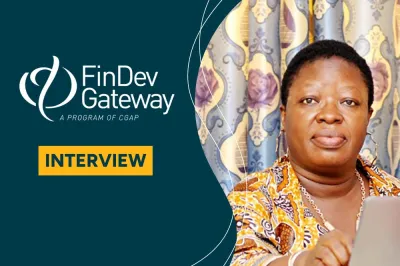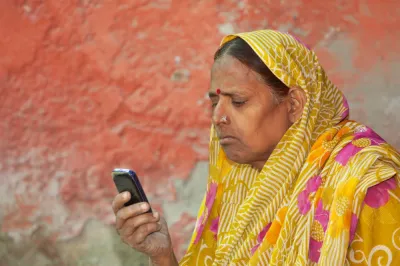FinDev COVID-19 Update | 05 - 18 Nov 2020
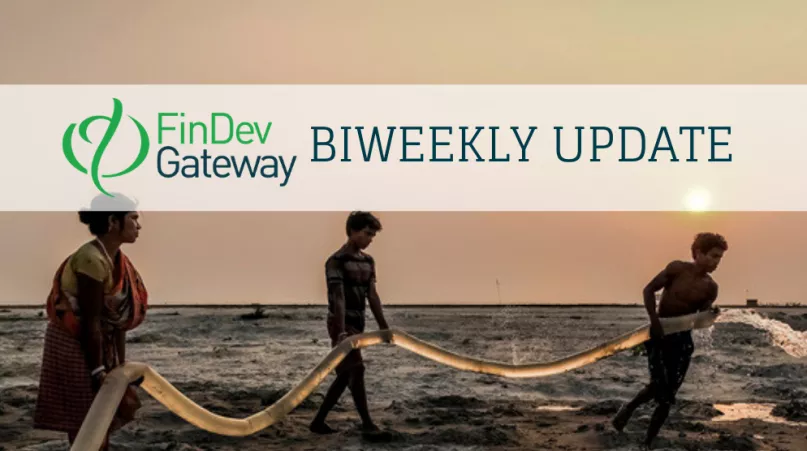
FinDev Gateway has created this COVID-19 Update with the latest and most relevant knowledge resources for financial inclusion. Sign up to receive this update to your inbox.
If you have content to share in our COVID-19 update, please submit here or contact us directly.
Do you find the FinDev Update useful? Take a moment to let us know >>
Global Update
- CGAP invites MFIs to complete the final wave of the Global Pulse Survey on Microfinance Institutions. Going forward, CGAP will continue providing insights through a new partnership with Symbiotics by analyzing performance data on more than 300 MFIs in the Symbiotics global portfolio. The first snapshot of such data published this week shows that MFIs are on a steady rebound since May, although that may not last. With client relief from moratoria waning, portfolio at risk appears to be growing. MFIs are taking a more conservative approach to lending by focusing on larger loan sizes which may limit access for some clients.
- According to Grameen Crédit Agricole Foundation, debt providers, investors and other support organizations are applying the principles they committed to in May to support the MFI sector. These conclusions are based on a recent analysis of 70 cases of debt rollover requests from MFIs, which found that lenders, in most cases, coordinated among themselves and applied handshake agreements, avoiding lengthy restructuring discussions. In turn, MFIs are expected to act responsibly towards clients and staff. On this related topic, CGAP is hosting a webinar featuring leaders in the MFI sector to learn more about how MFIs are managing debt moratoria and loan adjustments to alleviate pressure on clients’ finances.
- A recent FSD paper examines the potential drivers of financial resilience using data from the 2014 and 2017 Global Findex. The author finds that borrowing for consumption and for health are negatively associated with financial resilience. “At the country level, income inequality and unemployment substantially lower the likelihood of financial resilience while higher government spending raises it.”
Asia
- As the pandemic has prompted more Filipinos to use digital wallets, the country is gearing up to better support fintechs. The Philippine Central Bank plans to take advantage of fintech as part of its strategy to increase financial inclusion to 70 percent by 2023, and the Philippine Stock Exchange has plans to adjust its listing rules in a way that could facilitate the listing of local fintechs.
- In Myanmar, the MFI Maha shared how they have responded to the needs of their clients during the COVID-19 crisis. The institution focuses on consumer protection - through cash discounts, surveys to stay attuned to clients’ evolving needs and modifying staff incentives to ensure fair and respectful treatment of clients.
- 77 percent of Malaysian businesses are adapting to COVID-19 by accelerating digitalization plans, including introducing digital payments and launching digital products, according to a survey by Microsoft and International Data Corporation (IDC) Asia Pacific.
- Across East Asia and the Pacific, women were more likely to lose their jobs than men, according to high-frequency phone surveys conducted by the World Bank from May to June. In India as well, the pandemic has sharpened the gender divide in the workforce, where the already low work participation rate for women decreased from 9.15 percent in December 2019 to 5.8 percent in August 2020.
Africa
Some articles and knowledge resources referenced in this section are in French.
- In Somalia, a high mobile money penetration rate of 72 percent in IDP (internally displaced people) camps is helping humanitarian organizations transfer funds safely to beneficiaries and curbing the spread of coronavirus. The UN agency FAO is working with domestic telecom providers to deliver cash transfers through mobile phones.
- The microfinance association of Senegal is considering lowering interest rates in order to support entrepreneurship during the pandemic. Currently, the average interest rate applied by MFIs is 15 percent.
- The second round of World Bank’s Uganda High-Frequency Phone Survey on COVID-19 (July-August 2020) reveals that about 20 percent of households had to borrow money since March. The main reasons were employment shocks and loss of assistance from relatives. Most of them borrowed from friends, relatives or neighbours, while access to loans through formal financial institutions remained low (12 percent of households).
- UNDP and UNCDF launched a program for MSMEs in Togo that seeks to increase their resilience to shocks. 92 percent of businesses in Togo recorded a drop in sales between February and March 2020, the service sector being the most affected.
- As schools look to reopen in Kenya, households struggle to cover the cost of education. Loss of income and remittances led many households to use their savings to buy food or medication.
For more on Africa, check out the latest Portail FinDev Biweekly Update in French.
Latin America and the Caribbean
Most articles and knowledge resources referenced in this section are in Spanish.
- A new edition of the Global Microscope 2020 released this week by The Economist Intelligence Unit explores the important role of financial inclusion in LAC’s economic response and recovery from the COVID-19 pandemic. 19 out of the 21 LAC countries included in the Microscope were able to provide emergency relief funds to low-income households during a period of closures and confinements; 11 of those distributed those funds quickly and safely via financial accounts and digital wallets.
- The Association of Supervisors of Banks of the Americas (ASBA) says that the public and private sectors should work together to promote resilience, innovation and inclusion in the region’s financial system. The association outlines policy actions to increase crisis preparedness, address rising credit risk and preserve financial stability in the region in three new studies released recently.
- More than 100 practitioners from LAC came together to discuss the barriers to women’s financial inclusion in the region during the FinEquity Annual Meeting. Participating organizations agreed upon an agenda going forward, committing to work on the following areas: developing financial education programs with a gender lens, identifying social norms and regulatory barriers that limit or prevent access to and use of financial services by women, and increasing women’s representation in leadership positions in the sector.
- Peru’s historic Central Market of Lima joined the digital wallet initiative, “Billetera digital: Pago seguro,” which aims to promote the use of contactless payments and other more secure payment methods in food markets in the capital city. The campaign includes three of the most active digital wallets in the country: Bim, Yape and Tunki, which are also being used to deliver COVID-19 stimulus payments.
- In Nicaragua, the microfinance network ASOMIF estimates a 12.8 percent decline in the sector’s loan portfolio and a drop of 13.4 percent in the number of clients they serve by the end of the year, as a result of the COVID-19 crisis.
- Grameen Costa Rica is the first cash-free microfinance institution in the country, certified by the Central Bank of Costa Rica. The institution, has provided financing and training to more than 27,000 low-income women entrepreneurs and has managed to automate the banking processes for most of its clients.
For more on LAC, check out the latest Portal FinDev Biweekly Update in Spanish.
Arab World
Some articles and knowledge resources referenced in this section are in Arabic.
- The use of digital finance continues to increase across the region. Egyptian e-payment and banking technology platform Fawry’s profits went up by 90 percent during the first nine months of this year compared to the same period last year, largely due to the COVID-19 pandemic. In Bahrain, electronic real-time fund transfers jumped seven-fold last month, indicating an increasing adoption of digital banking during the coronavirus pandemic. Similarly, Abu Dhabi Islamic Bank reported last month that up to 94 percent of banking transactions, including fund transfers, are now conducted digitally as a result of the pandemic. This strong increase in digital services continues even after the phased re-opening of the UAE economy.
- In Tunisia, the microfinance institution Enda Tamweel raised close to $10 million on the bond market.
- The United Nations Relief and Works Agency for Palestine Refugees, which supports 5.7 million Palestinian refugees in the Middle East, announced it has run out of money to pay the salaries of 28,000 staff members in November and still needs at least $70 million to continue its education, health, and financial services during the pandemic.
For more on the Arab world and resources in Arabic, check out the latest FinDev Update in Arabic.
COVID-19 Resources
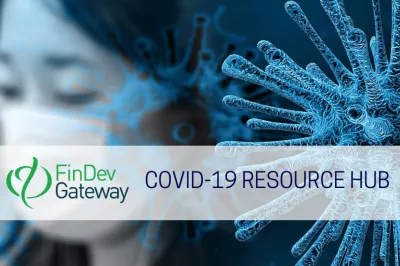
COVID-19 Resource Hub
A collective space for the financial inclusion community to share experiences and lessons learned from the pandemic
FinDev Coronavirus Data Tracker
Data relevant for financial inclusion - find out who is tracking what
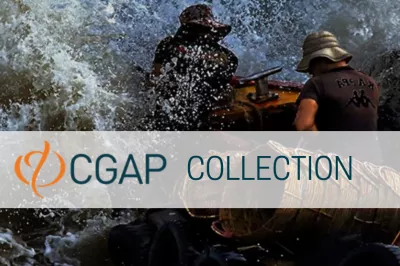
Blogs & Opinion
If you have a blog idea and would like to write for the FinDev Blog, please review our guidelines. We do not cross-post blogs that have been published elsewhere, but if you wish to share an existing blog post in our next FinDev COVID-19 Update, you can send it to us using our contact form.
Financial Institutions
Governance in Times of Profound and Systemic Crisis
17 Nov 2020 | Robert Christen | Boulder Institute of Microfinance
Sustaining Savings Groups Linked to Financial Institutions Amid the COVID-19 Crisis
17 Nov 2020 | Thomas Bariti & Anup Sing | Making Finance Work for Africa
Microfinance Investment
How COVID-19 Is Changing Financial Inclusion
10 Nov 2020 | Frank Streppel | Triodos Investment Management
Digital Transformation
Data + Digitization: The Key To Helping African Banks and Microfinance Institutions Support Their Customers During COVID-19
18 Nov 2020 | Cate Rung | NextBillion
Pandemic-Fueled Digitization: Who Remains Excluded?
17 Nov 2020 | Mondato
Bridging the Digital Divide to Scale up the COVID-19 Recovery
05 Nov 2020 | Patrick Njoroge & Ceyla Pazarbasioglu | IMF
Focus on Clients
How Consumer Protection Has Driven Maha’s COVID-19 Response
12 Nov 2020 | Pallavi Hariharan, Matteo Marinelli & Chiara Pescatori | CFI-Accion
Finance Fit for Opportunities and Shocks: What Helps Poor Clients Most
05 Nov 2020 | James Copestake & Sukhwinder Arora | CGAP
Lending For Water and Sanitation During COVID-19
05 Nov 2020 | Jessica Jacobson | CFI-Accion
Socioeconomic Impact
Tracing Covid-19’s Impact on Households Across the World
13 Nov 2020 | Carlos Sabatino, Silvia Malgioglio, Nobuo Yoshida & Jee-yeon Seo | World Bank
Uganda High-Frequency Phone Survey on COVID-19: Results from Round 2
13 Nov 2020 | Aziz Atamanov, John Ilukor, Talip Kilic & Giulia Ponzini | World Bank
Series on Kenya Financial Diaries:
- How Are Things Now? Summary of September/October COVID Diaries Findings
- Investors and Indigents: Divergent Trajectories of Kenyans in the COVID Era
- A Bridge Too Far? Paying for School in an Economic Crisis
- Finance Bends; Will It Break?
11 Nov 2020 | Julie Zollmann | FSD Kenya
How Hard Are Families Hit By The COVID-19 Crisis? Six Insights From Our Household Surveys in East Asia and Pacific
06 Nov 2020 | Lydia (Ypsse) Kim, Maria Ana Lugo & Ikuko Uochi | World Bank
New Interactive Data Tool
View the full list of COVID-19 data sources on the FinDev Data Tracker.
COVID-19 High-Frequency Monitoring Dashboard
World Bank
This new dashboard tracks the impact of the COVID-19 pandemic across countries and over time. The tool provides results of COVID-19 high-frequency surveys in over 30 countries, which will expand to over 100 countries in 2021.
Recent Publications
Do you have a publication to add to this list? Share your work on FinDev Gateway.
MFIs on the Rebound, but Will It Last?
CGAP | Nov 2020
The Prevalence and Drivers of Financial Resilience Among Adults
Financial Sector Deepening Trust Kenya (FSDK) | Nov 2020
Signatory Organizations Report on COVID-19 Pledge Implementation and Lessons Learned
Grameen Credit Agricole Microfinance Foundation | Nov 2020
Asia Small and Medium-Sized Enterprise Monitor 2020 – Volume II
Asian Development Bank (ADB) | Nov 2020
COVID -19 Recovery Is Likely To Fail Women- Digital Financial Services Can Help, if Designed Well
MicroSave Consulting (MSC) | Nov 2020
COVID-19 and Gender Equality: Six Actions for the Private Sector
International Finance Corporation (IFC) | Nov 2020
View All Publications Related to COVID-19 >
Webinars
EaSI Technical Assistance Webinar - Leading Change in Volatile Times
25 Nov | European Microfinance Network
Microfinance and the Poor in Times of Crisis
30 Nov 2020 | CGAP
View All Upcoming Events Related to COVID-19 >
News
CGAP, Symbiotics Partner to Monitor COVID-19’s Impact on Microfinance
| Symbiotics SA | Global
Remittances to Fall for First Time in 11 Years
| VnExpress | Vietnam
View All News Related to COVID-19 >
Quick Links:
FinDev Guide
About this guide
Published
Topics
Contributed by a global financial inclusion community member. Share your lessons learned
Write for usLeave a Comment
Comments on this page are moderated by FinDev Editors. We welcome comments that offer remarks and insights that are relevant to the post. Learn More
